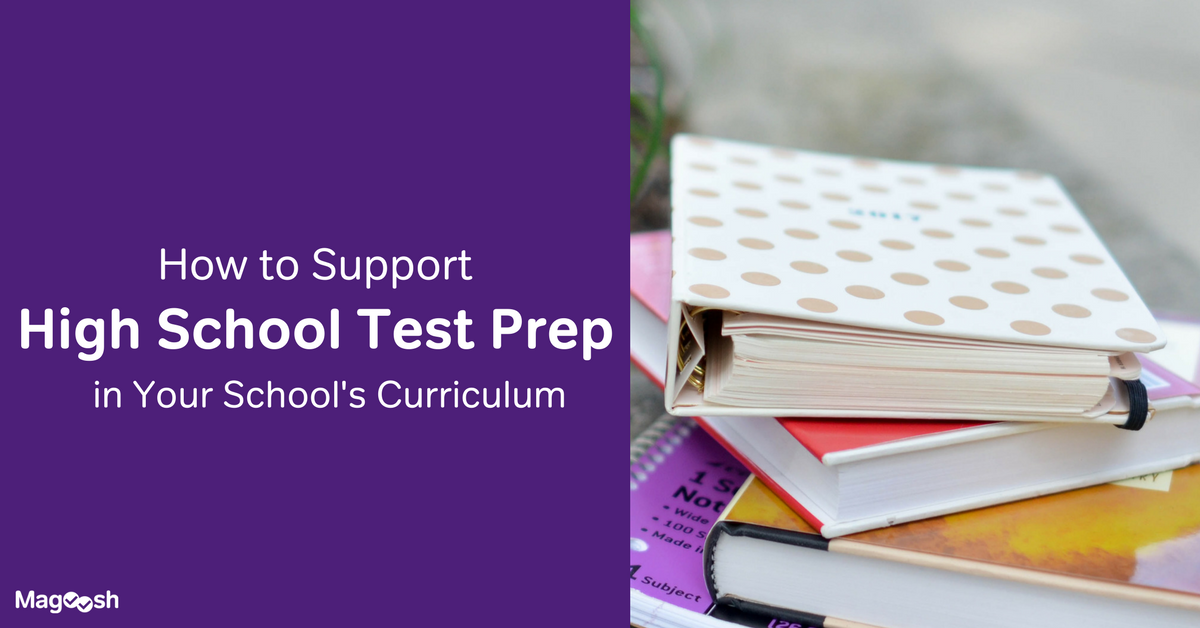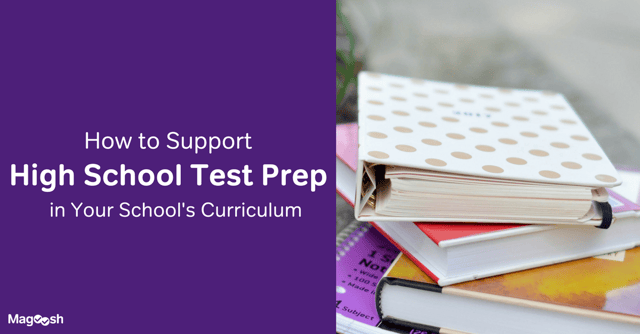7 min read
How to Support High School Test Prep in Your School's Curriculum
![]() Nadyja Von Ebers
:
Jan 18, 2018 7:46:00 AM
Nadyja Von Ebers
:
Jan 18, 2018 7:46:00 AM

As busy instructors who must simultaneously juggle our own subject curriculum and adequately prepare our students for the ACT, SAT, and college readiness in general, it can be hard to strike a balance. That’s why we’re here to help!

Let’s take a look at several of the ways that teachers can best support high school test prep at your school. Depending on the subject you teach and the needs of your student body, you can use any combination of the following strategies that work best for you.
1. Incorporate Mini Lessons Into Class Content
As all seasoned teachers know, students’ (and all people’s!) attention spans are not nearly as long as a full class period, especially if your school uses block scheduling! This means that students have to change modalities frequently, which likely keeps you on your toes, and keeps you creative with managing time. The good news is that incorporating high school test prep “mini lessons” into your general curriculum is a great way to break up class periods and spread test prep over the course of several weeks or months. So, what does incorporating “mini lessons” actually look like? There are several ways to go about it.
Try a “question of the day”
If you’re aiming for long-term high school test prep and are a fan of consistent bell-ringer activities, consider opening your class with an ACT- or SAT-related question (or tip!) of the day. You can pull questions from practice tests (there are plenty of ACT practice tests and SAT practice tests out there). The ACT also provides several free test prep resources on their official ACT website, including study guides and a wealth of “questions of the day.” Likewise, the SAT provides an easily downloadable daily practice for the SAT app. While these resources are technically meant for students, they’re a great asset to teachers as well.
Work in related lessons or drills
A nice way to shift gears while focusing on ACT or SAT test prep is to designate a chunk of class time to a topic you are currently studying, but framed in the manner it is addressed on a particular test. For example, if you are currently teaching a unit on plane geometry, say specifically on the subject of triangle properties, then you could work in a few minutes of sample problems related to triangles, as they appear on the test. This keeps students focused on the core material while getting them in the mindset for the test. You can do this with whatever regularity makes the most sense in your classes. Weekly lessons work well further out from test dates, while daily lessons can be beneficial the week before test dates.
Add pops of auxiliary material
Depending on the subject you teach, you won’t always be able to incorporate a related lesson into your curriculum. This is especially the case in literature or language arts classes that may not focus heavily on the mechanical skills tested on both the ACT and SAT. In fact, many English teachers grapple with how to teach grammar and style in the first place, and sometimes avoid doing so. But including short weekly lessons on some of the linguistic conventions on standardized tests is actually a great way to address mechanical concerns without boring your students to death by making them memorizing loads of grammar rules at once. So, for example, spend 10 or 15 minutes one day addressing subject-verb agreement, idioms another day, and so on. Both Purdue University's Online Writing Lab and ReadWriteThink.org are excellent resources for short but powerful lessons on an array of subjects that need to be included quickly and efficiently.
Use alternating test and answer days
If you want to focus on familiarizing your students with the broader test format in your subject, consider designating a bit more class time (say half a class to a full class period, depending on length) to issuing full or partial practice tests, and discussing the answers on a different day. For example, issue a practice test during the second half of class on a Friday, and then go over some of the answers during the first half of class Monday. A nice way to execute this method is by issuing tests at the end of course units, before moving on to fresh content, or around holiday breaks, where you will likely have a few “stray” days.
Encourage teamwork and utilize games
For a bell-ringer or closing activity, let students work in pairs or small groups for a few minutes to solve practice problems or answer practice questions. You can even frame these activities as “group quizzes” which raise the stakes for students while still encouraging collaboration. Or, to up the stakes even more, you can have students compete as small teams against each other in order to see who can solve a problem or answer a question first--with or without prizes issued.
You can also let students quiz each other on test prep content using quizlet (on which there is a wealth of searchable ACT and SAT related content), and you can even designate regular chunks of class time to letting students create their own quizlet quizzes and quiz each other. This is a fun and interactive way to break up class time while giving students authority over the subject matter.
2. Lead After-School or Saturday Sessions
Not all schools will have the resources for supporting after-school or Saturday high school test prep sessions. But if your school does, or if you are willing to volunteer your time, then hooray for your student body!
The key to leading sessions outside of school is to be as efficient as possible. This is because students will be likely be tired and loaded up with homework for their actual classes, so you’ll want to to be economical with their time and energy (as well as your own!). So keep the following in mind when leading supplemental high school test prep groups.
Have a plan
The earlier you start your supplemental high school test prep sessions, the better. Consider teaming up with a teacher from each subject area and then using a long-term plan, such as this six month ACT study guide (which also includes links to three and one month study guides if you’re on a tighter schedule). Again, while these guides are geared toward students, you can share and lead these lessons in a group setting.
Change modalities often!
Depending on the frequency and length of your study sessions, you’re going to need to change up the pace often to keep your students’ attention and energy. Let’s say you are teaching a 3-hour Saturday study session on one particular subject. You could break up your time as follows:
- 30 minutes: Lecture on or explain a particular concept
- 30 minutes: Give students a practice test
- 30 minutes: Allow students to discuss results of practice test amongst each other
- 30 minutes: Go over answers as a group and field questions on most commonly missed questions
- 30 minutes: Allow students time to make their own quizlet quizzes based on types of questions missed
- 30 minutes: Allow students time to quiz each other or to ask you any questions they may have
You may also want to break up longer sessions into chunks focusing on different subjects, but keep in mind that this will provide less in-depth exploration of the content. If you meet more than once a week, don’t issue a full practice test each session, as it is easy for students to get burnt out this way.
Work in some non-traditional test prep
During at least some sessions, try not to include any formal test prep material, as it can begin to feel monotonous to students. Instead, try to work in some of the skill sets needed on the standardized tests in a more organic way. For example, instead of working through sample close reading passages and practice questions, consider reading a fun short story or essay together, breaking down paragraphs and practicing close reading skills casually and organically. You can choose an engaging story that may be more accessible or palatable than some of the passages that tend to appear on standardized tests, but still drive home the same skills needed on the tests (e.g. identifying main and supporting ideas, defining words in context, etc.).
3. Help Identify Students Who Need Extra Support
The fact is that some students are simply strong test-takers and will need less help than others, in or outside of class. But for those who may struggle with academics and test-taking, it’s particularly important that you as their teacher act as a first line of support in getting them the help they need--especially if class time is limited for test prep. Doing so hinges on identifying students who need additional support, and then pointing them in the direction of appropriate test prep materials or tutors.
Signs a student needs additional support:
- Grades and GPA
A student’s grades and GPA don’t always portend their level of success on standardized tests, but often they do. Any student struggling academically in the subject you teach (below a C or struggling to maintain a C) is a good candidate for additional high school test prep outside of school.
- Performance on practice tests
Practice tests are an outstanding way to gauge students’ proficiency and mastery of a subject matter and can typically be issued even if class time is limited. Depending on how early in the year you issue the test, all of your students may perform lower than they will on the actual test, but students who miss roughly half the questions should be steered towards supplemental test prep.
- Performance on actual tests
If a student has taken the ACT or SAT and performed low enough to make college acceptance unlikely, then the student should receive additional support.
- Test anxiety
There are many ways to help reduce students’ standardized test anxiety, but familiarity and practice are major factors in stress reduction. So any students suffering from test anxiety will benefit from additional support.
Types of support:
- Test prep resources
Consider pointing your students in the direction of ACT prep or SAT prep plans, most of which include some free resources as well as more elaborate and interactive features and apps for purchase.
- Tutors
The right test prep material is often sufficient in helping students improve,
especially if they are also receiving test prep in school. But in some cases, tutors can be useful in helping students improve and achieve their desired results. You can provide students some helpful advice for finding the right test prep tutor, or help them reach out to tutors employed by the test prep programs they sign up for.
4. Offer Extra Credit for Test Prep Work
Finally, if time is limited for high school test prep both in and outside of class at your school, consider incentivizing the studying experience for students by offering them extra credit for completing test prep material. This can include the completion of practice tests, practice essays, original quizlet quizzes, test corrections with explanations of answers, short research projects on test topics, etc.
Extra credit for test prep work can motivate students to do well in class and on the test, which is doubly beneficial for them.
Happy Prepping!
Regardless of the methods you use to help support your students in their high school test prep process, remember to try to keep it as fun and varied as possible. As you know, your students have a lot on their plates and test prep can be overwhelming, so here’s to making test prep as interesting and effective as possible!



